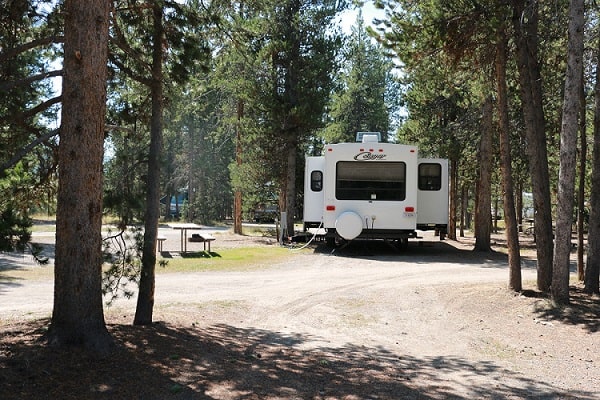Top Tax Deductions for RV Owners You Need To Know Of
- RV Propane Fill Stations Guide - February 17, 2022
- Geico RV Insurance Review and Guide - February 17, 2022
- Best Airstream Alternatives To Consider - October 28, 2021
While talking about RVing may be one of your favorite things to do, talking about taxes probably isn’t. However, it’s a necessary evil, and the two overlap, believe it or not, so you’ll want to read on to find out how you can maximize your deductions at tax time.
If you have an RV that you use for traveling, you may not already know that you can take some deductions on it. Whether you live in a house and you only use your RV and house trailer part-time or you live in an RV full-time like a regular nomad, you can take advantage of some of these deductions to get the most out of your RV lifestyle.
For RV owners who live in an RV full-time, our tax deductions are limited when it comes to the traditional brick-and-mortar homeowner. However, there’s an overlap you’ll want to know about because you can still take some of these deductions and you may not even know it.

1. Deduct the interest on your RV loan
If you own an RV, you likely financed the cost. RVs are expensive. Even the cheapest RVs cost tens of thousands of dollars so it’s important to be ahead of your RV financing. If you do have a loan on your RV, you can deduct the interest, much like you can deduct the interest on your home loan.
This RV tax deduction (as well as the sales tax, personal property tax deductions, homeowner tax deductions, and home mortgage interest deduction) is only available to those who have enough deductions to itemize using Schedule A. Because full-time RVers no longer have a brick and mortar home, this typically eliminates them.
Without a mortgage and real estate taxes, it can be tough to qualify for a business tax deduction on this one, but there are exceptions, so seek help from a accountant or tax specialist to find out more. In fact, don’t be discouraged, because when you add in medical expenses, charitable giving, and state and local taxes, you can use this form.
Look into what the standard allowed deduction is for you, whether that’s single or married because it changes every year. If your deductions add up to more than that, your RV qualifies as a first home (or second home, if you have a mortgage interest deduction), and you can deduct the interest. Yay!
There are a couple of other caveats to keep in mind here. You cannot deduct the interest on your RV loan if your loan is not secured by the RV and if you are already taking deductions on two other homes.
2. Take the home office deduction if you work from your RV
Let’s take a moment to remind ourselves that you can always deduct business expenses. If you are traveling for business, you can deduct your expenses. That means a portion of your gas, mileage, food, and lodging. Now, as for whether RVers qualify for the home office deduction or not is a different story. You can qualify, but it’s pretty difficult to do. Let’s go over how the deduction works.
The IRS requires that in order to take a deduction for a home office, you must use that space exclusively for business purposes. Because RVs are so small, it’s tough to dedicate a space 100% to business and it’s very difficult to prove this exclusive use.
Even if you did dedicate a space for business use only, it would be so small that it’s hardly worth keeping the documentation and making the calculations. It’s usually not worth the hassle to take this deduction. In many RVers’ experiences, even a small amount of recreational use doesn’t sit well with the IRS and it could result in your deduction being denied, or worse.
With that, you may consider that in recent years, the IRS has allowed for a more simplified home office deduction, making it easier to compute. While the space must still be used exclusively for business, you can calculate $5 per square foot up to 300 square feet.
You also have to keep accurate records, and RVs with this deduction tend to raise a red flag. There are better ways to make use of your small living space and get the most out of your RV tax deduction.
3. Rental deductions
Here’s a totally different spin on a business deduction. Your RV is the business. That’s right. If you use your RV as, say, an Airbnb more than 50% of the time, you can deduct your rental income on your taxes.

Pretty cool, huh? You have to be diligent about how you record business vs. pleasure and document your rental income diligently. Depreciation is also another easy write off if you’re using your RV as a business. It’s a great way to recoup some of your costs.
The details can get hairy, as far as how many days it has to be rented, how many days you can use and live in it, etc., so consult a tax attorney for more information on how it works.
4. Deduct your phone and internet
Let’s say you work on the road. You need your phone and internet, right? This business tax deduction is available to you if you operate your business on the road. The tricky part is calculating the percentage of business usage for each. You can’t deduct personal cell phone and internet use.
A good way to estimate your business use is to track it for a couple of months and then average it over the rest of the year. Try not to claim more than 50% business use unless you can prove it.
Remember that you’re using your data for personal emails and texts, streaming, researching travel, and phone calls. But certainly don’t leave this deduction off. It can really help you with tax savings, especially when you’re trying to stay connected on the road.
5. Deduct mileage for your travel
If you have a motorhome rather than just an RV you tow, you can deduct the mileage you drive for business. Just like you would in your car, you’ll want to keep detailed records of these miles. It doesn’t matter whether you are running errands for your business or meeting a client for coffee. You need to keep a note of the date, the round-trip miles, the purpose of the trip, and who you were meeting or the store you went to.
Not only does this make it easy at tax time to record your deductions, but it will help you prove your deductions to the IRS if needed.
This can get tricky, because let’s say you need to travel to another city to meet a client, and you and your family decide to hop in the RV and do some sight-seeing while you’re there. Is the purpose of the trip business or recreation? Can you deduct the miles you travel or not?
You can, in fact. If your primary reason for traveling in business, you can deduct the miles from Point A to Point B as a business expense. However, there’s still a bit of gray area here, so be careful. Point A has to be your place of business more than 50% of the time, whether that’s your home or your office. And in some cases, more than 50% of your trip has to be for the business before you can deduct that mileage.
Just remember, deducting thousands of miles begins to look suspicious to the IRS, so it doesn’t mean you can’t travel for business in your RV and deduct the mileage, it just means you need to be careful what you designate as business vs. pleasure.
6. Claim the mileage on your car
Here’s a pro tip. If you don’t feel comfortable claiming the mileage on your RV, especially if you’re a full-timer, claim the mileage on your car instead. If you have a toad (that’s a towed vehicle) that you use while you’re at your destination, you can take deductions on that mileage.
You likely split your time in this vehicle between business and personal use, so you’ll have to divide your expenses and keep detailed records, but you can keep track of your mileage and claim it as a deduction, even if you decide to skip out on the RV mileage deduction.
Deducting the mileage of a towed vehicle is usually a lot easier and doesn’t raise as many red flags. There are two ways you can calculate your mileage. The first is the standard mileage rate (which changes every year) x the number of business miles you drove.
The other is a calculation of the average expenses for business use, including RV insurance, maintenance, and gas. The standard mileage is usually easier to figure out and will result in a larger deduction, but every situation is different.
7. Sales tax and income tax deductions
If you paid rv sales tax deduction on your RV, you can deduct it. There are several states that don’t charge sales tax, and obviously, if you didn’t pay it, you can’t deduct it. The IRS also places a limit of $10,000 on the amount of sales tax you can deduct.

However, you still have to have enough deductions to itemize on a Schedule A. If you’re itemizing your deductions on your Schedule A, you can claim either your state and local income taxes or your state and local sales taxes. It’s in your best interest to do the math to figure out which gives you the most RV tax benefits.
When you make a large purchase like an RV or a vehicle, it’s typically better to take the sales tax deduction, but it can depend on your tax rate and your personal income. For instance, if you live in a domicile state without income tax, you’ll want to take the sales tax deduction.
8. Personal property tax
If you’re domiciled in a state with personal property tax, you’ll want to take that deduction, too. You can take this deduction on any personal property, like a car, truck, SUV, or RV. It’s just one more thing you can itemize on your Schedule A to help put you over the threshold.
However, many full-timers are domiciled in states that don’t have personal property tax, which is a great thing because you don’t have to pay it, but simply means you can take fewer deductions at tax time.
9. Domicile
I’ve thrown this term around a few times already, so we need to clear the air. Your domicile state is where you’ve set up your permanent address and where you file your taxes. Some states have an income tax, sales tax, and personal property tax. Others don’t.
Some states don’t require you to show up in person to renew your driver’s license while others have a renewal period of every 10 years. You can see why any combination of these things would be great for full-time RVers.
The most popular domicile states are South Dakota, Florida, and Texas. However, Oregon doesn’t have sales tax and Tennessee doesn’t have an income tax. Some people prefer to keep their domicile state in their home state, even though they don’t reap any of these tax benefits.
Take these things into consideration when deciding whether or not you want to RV full time and how you might want to file your taxes in the years when you’re on the road.
10. Install solar panels for solar credit
The government will give you a bonus deduction if you install solar panels on your home, but did you know they’ll also do the same if you install them on your RV? That’s right. Anyone who installs solar panels on a personal residence, including an RV, will get a deduction.
It’s a non-refundable credit on your 1040 that you can carry forward if you don’t have enough tax liability to take it right away.

11. Health insurance premiums for the self-insured
Many full-time RVers are self-employed and, therefore, self-insured. That means you can deduct your health insurance premiums. If you get your health insurance from the marketplace or any other private insurance company, you qualify to take this deduction.
It goes on your 1040 and helps to bring your income down, which is helpful when determining your premiums for the next year.
Keep in mind that health share ministries do not count toward these health insurance premiums, so you cannot deduct these. This deduction is also limited by your business income.
12. The 20% pass-through deduction
This deduction started in 2018. It’s part of the Tax Cut and Jobs Act. It gives a 20% deduction to people with self-employment income, including partnerships, sole proprietors, and S-Corp owners.
While the deduction is complicated and may be limited by your income, you can qualify with a taxable income of less than $315,000 if married and filing jointly or $157,500 if filing singly. You must also have a net profit from a small business.
This is a good one for those who are self-employed, which includes many RVers.
13. Ad valorem tax or ‘use tax’ deduction
Some states, like Massachusetts and Georgia, apply a use tax to cars, boats, and RVs. You pay it upfront when you get your tags, but it’s deductible on your Schedule A. It has to fit into the same $10,000 limit as your sales tax, but if it does, you’ll want to take it.
14. Taking a standard deduction
The last decision you have to make is whether you want to take any deduction at all. It takes a lot of itemization to make deductions worthwhile.
For some people, itemizing deductions simply isn’t worth the hassle. While you may get quite a deduction for your itemizations, the standard deduction is also quite significant, and itemizing your deductions is a lot of work.
Itemized deductions include medical expenses, charitable contributions, state taxes, local taxes, sales tax, mortgage interest (or RV loan interest), and a few other things we’ve already mentioned here.
If you don’t have enough to make an itemized deduction, you can take the standard deduction. You may also choose to take the standard deduction if you simply don’t want to keep a record of your itemized deductions throughout the year.
FAQs
Can you use an RV as a tax write off?
There are many ways you can take deductions on your RV, from the sales tax and personal property tax to mileage or for use as a home office. It just depends on how you use the RV. Make sure you do what works best for you and research the ins and outs of the particular deduction you want to take.
As an RV owner, there will be some deductions you don’t qualify for, especially if you’re a full-timer, but there are plenty of opportunities to try.
If you’re living in your RV, the IRS may consider it a home, which means you can deduct the interest if you currently have a loan. It’s definitely worth looking into because if you don’t have a home, you won’t have this itemized deduction, which clears up some room on your tax return.
Can you write off an RV as a business expense?
This is a tricky question because there are a lot of different business deductions you can take. There’s a home office business deduction, mileage deductions, and internet and phone deductions, just to name a few.
You can technically use them all if you’re living in an RV, but some are harder to claim than others, and it depends on your circumstances. For instance, for the home office deduction, you have to be able to prove that you use that space exclusively for business.
In something as small as an RV, that can be tough to do, though not impossible. The mileage and phone and internet deductions are easier to take, as long as you keep detailed records of each expenditure.
Does my RV qualify for section 179?
If you use your RV for business use only (as in you rent it out on Airbnb) and you do not use it for personal travel at all, you may qualify for a Section 179 deduction. If you don’t live in it or travel for recreational purposes, and every overnight stay is for business, this qualifies as transient lodging.
Both transient lodging and overnight stays for business qualify for Section 179 deductions, which give you big benefits on your personal taxes. Just make sure you understand the law, and seek help before you file if you need it.
Final Thoughts
Taxes can be confusing, and if you have any questions at all, you should consult a tax attorney or professional to help. We’ve just brushed the surface of tax deductions for RVers and how they work.
Look into the ones that work for your specific situation to make the most out of your deductions. Because the IRS regularly changes these deductions and how they can be taken, it’s important to keep updated or work with someone who knows.









